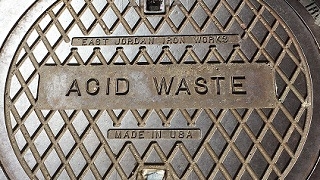Clean Water Act
 First passed in 1972, the Clean Water Act (CWA) serves to maintain chemical, biological and physical integrity of the navigable waters of the United States. The CWA made it unlawful to discharge any pollutant from a point source into navigable waters, unless a permit was obtained. EPA's National Pollutant Discharge Elimination System (NPDES) permit program controls discharges. Individual homes that are connected to a municipal system, use a septic system, or do not have a surface discharge do not need an NPDES permit; however, industrial, municipal, and other facilities must obtain permits if their discharges go directly to surface waters. Georgia Tech discharges all of our wastewater to a combined storm and sanitary sewer system operated by City of Atlanta and regulated by Atlanta’s NPDES permit.
First passed in 1972, the Clean Water Act (CWA) serves to maintain chemical, biological and physical integrity of the navigable waters of the United States. The CWA made it unlawful to discharge any pollutant from a point source into navigable waters, unless a permit was obtained. EPA's National Pollutant Discharge Elimination System (NPDES) permit program controls discharges. Individual homes that are connected to a municipal system, use a septic system, or do not have a surface discharge do not need an NPDES permit; however, industrial, municipal, and other facilities must obtain permits if their discharges go directly to surface waters. Georgia Tech discharges all of our wastewater to a combined storm and sanitary sewer system operated by City of Atlanta and regulated by Atlanta’s NPDES permit.
The Safe Drinking Water Act was originally passed by Congress in 1974 to protect public health by regulating the nation's public drinking water supply. The law was amended in 1986 and 1996 and requires many actions to protect drinking water and its sources: rivers, lakes, reservoirs, springs, and ground water wells. Georgia Tech gets all of our drinking water from City of Atlanta.
Periodically we will perform investigations when we are notified that there may be a potentially contaminated drinking water supply. If the water in your Georgia Tech building doesn’t taste right, please let us know. You may also want to contact Infrastructure and Sustainability to request a filter be installed.
Acid Dilution Tanks
 Most of our science buildings are equipped with acid dilution tanks. These tanks are specially designed to collect acid waste that is discharged directly from labs via special drain lines. The acid dilution tanks usually contain a neutralizing agent such as limestone. The acid waste is held in the tank until it is neutralized enough to then be released harmlessly to the city sewer system. This provides an alternative to storing the waste in collection bottles, scheduling pickup and the elevated cost of disposing as hazardous waste.
Most of our science buildings are equipped with acid dilution tanks. These tanks are specially designed to collect acid waste that is discharged directly from labs via special drain lines. The acid dilution tanks usually contain a neutralizing agent such as limestone. The acid waste is held in the tank until it is neutralized enough to then be released harmlessly to the city sewer system. This provides an alternative to storing the waste in collection bottles, scheduling pickup and the elevated cost of disposing as hazardous waste.
Our job is to periodically check the waste tanks to ensure that they are neutralizing acid waste as planned. If you encounter problems with the acid waste collection system in your building, please contact us immediately.